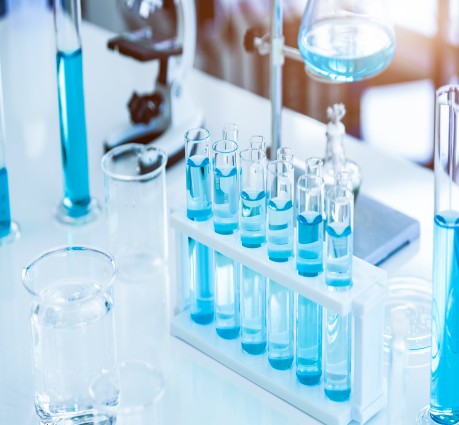The B.Pharm programme is a comprehensive course that focuses on the study of drugs and medication. The programme aims to equip students with knowledge and skills in the field of pharmacy and enable them to become competent pharmacists. During the programme, students learn about pharmaceutical chemistry, pharmacology, pharmacognosy, pharmaceutical analysis, pharmaceutical engineering, and clinical pharmacy. They also gain knowledge about the legal and ethical aspects of pharmacy, drug regulation, and the management of pharmacy businesses.The curriculum includes theoretical and practical components, with students participating in laboratory sessions, case studies, and internships to gain hands-on experience in pharmacy practice. If you are looking for a B.Pharm college in Chhattisgarh, CVRU is the best university for B.Pharmacy in Chhattisgarh, offering top-notch education, experienced faculty, and state-of-the-art infrastructure.Graduates of the B.Pharm programme can work in various settings, including community pharmacies, hospitals, drug manufacturing companies, research laboratories, and regulatory agencies.
Duration of Program
Level of Study

The B.Pharm. programme educates and trains students to become qualified pharmacists for safe medication therapy.
The programme aims to provide a strong foundation in the sciences, pharmacy practise, and social responsibility.
The B.Pharm. programme aims to produce skilled pharmacists for safe and effective medication use.
The B.Pharm. programme aims to foster social responsibility and leadership in pharmacy professionals.
PO1 Pharmaceutical Knowledge : Students gain a deep knowledge regarding the human body, its related diseases, analytical skills, drug molecules (Active Pharmaceutical Ingredients) along with excipients, natural drug resources, the chemistry involved in API including synthesis of commonly used drugs, the effect of a drug on the human body, toxicity, and impurity profile, ADME studies of drugs (behavior of a drug in the human body), dosage form studies including novel approaches, designing and development of formulation stability studies, analysis, etc.
PO2 Research Analysis : Students could apply the knowledge in the research field to make discoveries.
PO3 Design & Development of dosage forms : Various dosage forms could be prepared by pharmacy students in pharmaceutical companies for the ease of patients.
PO4 Conduct investigations of complex problems : Use research-based knowledge and research methods including design of experiments, analysis and interpretation of data, and synthesis of the information to provide valid conclusions.
PO5 Modern methods usage : Create, select, and apply appropriate techniques, resources, and modern methods with an understanding of the limitations and their usage. The student also learns to handle many instruments related to their studies which would help them work in a Pharmaceutical Industry, pharmacovigilance, regulatory requirements, legal processes, etc.
PO6 Pharmacy and society : Pharmacist provides complete health care data and practices to the people of the society and guides them to be healthy. The student also learns about drug distribution systems, patient counseling, industrial laws, etc. The student gains expertise in the storage and distribution of drugs with all precautions and in-depth knowledge of dose, adverse effect, and other health-related issues to deal with indoor and outdoor patients admitted in hospitals and also in public.
PO7 Environment and sustainability : Understand the impact of the professional pharmacist in society and the environment, and make an impact of it on the people of the society.
PO8 Ethics : Apply ethical principles and commit to professional ethics and responsibilities and norms of the pharmacy practice. The student is also trained in ethical behavior with physicians, nurses, and other paramedical staff for protecting patient’s health.
PO9 Individual and team work : Function effectively as an individual, and as a member or leader in a diverse team and acts as a multidisciplinary person in every context.
PO10 Communication : Communicate effectively on pharmaceutical activities with the community and with society.
PO11 Life-long learning : Recognize the need for, and have the preparation and ability to engage in independent and life-long learning in the broadest context of technological change.
PO12 Social Interaction : Being a public welfare job a pharmacist would be able to interact with the people in a better way to cure them and make them feel healthy.
PSO1 : Able to apply the knowledge gained during the program from pharmacology, pharmaceutics, medicinal chemistry, Pharmacognosy, APHE, communication skills, pharmaceutical analysis, Biotechnology, biochemistry, cosmetology, and environmental studies.
PSO2 : Able to apply the knowledge of ethical and management principles required to work in a team as well as to lead a team.
PSO3 : Able to do multidisciplinary jobs in the pharmaceutical industries in various branches and would be able to write effective project reports in a multidisciplinary environment in the context of changing technologies.
PSO4 : Able to communicate easily and comfortably. Would be able to perform multi-tasks in multi fields including pharmaceutical & cosmetics. The research area would be strong.
PEO1: Pharmacy graduates will have a strong background in pharmaceutical sciences, excellent knowledge of drugs and pharmaceuticals, and excellent skills to cater to the healthcare needs of society. They can also use these tools for personal and professional endeavors.
PEO2: To impart sound knowledge in the different curricula like Pharmacognosy, Pharmaceutical Chemistry including Analytical Chemistry, Pharmaceutical Biotechnology, Pharmacology, Formulation, and Development to be utilized for designing and creating novel herbal or synthetic pharmaceutical products in the view of drug discovery at an affordable price for the benefit of a human being.
PEO3: To acquire knowledge towards the current needs in the research activities carried out in various fields of pharmacy which implies the novel research approach towards the drug discovery and development to fulfill the requirement to save the patient from various unrevealed disease ailments.
PEO4: To promote health improvement, wellness, and disease prevention in cooperation with the public and patient community, and other members of an inter-professional team of health-care providers through periodical updating of Drug Information.
PEO5: To provide a conducive, congenial atmosphere that enables the students to acquire excellent attitudes, behaviors, and moral and ethical values to nurture the profession competently.
PEO6: To inspire the students to pursue higher education and to appear for competitive exams and other value-added programs for their holistic development.